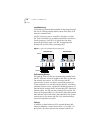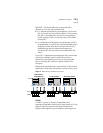
20 CHAPTER 1: INTRODUCTION
be members of the same VLAN. Membership in a VLAN is
determined by a VLAN tag that is transmitted with the
Ethernet frame for use by a switch.
With VLANs, you can define a network according to:
■ Organizational groups—For example, you can have one
VLAN for the Marketing department and one for the
Finance department.
■ Application groups—For example, you can have one
VLAN for e-mail users and one for multimedia users.
Implementing VLANs on a network has these advantages:
■ It eases the change and movement of devices on
IP networks.
With traditional IP networks, if users move to a different
IP subnet, the IP addresses of each workstation must be
updated manually. With VLANs installed, if an end
station on VLAN 1 is moved to a port elsewhere on the
network, you need only to specify that the new port is
on VLAN 1.
■ It helps to control traffic.
With traditional networks, congestion can be caused by
broadcast traffic that is directed to all network devices
whether they require it or not. Each VLAN can be set up
to contain only those devices that need to communicate
with each other, increasing network efficiency.
■ It provides extra security.
Devices within each VLAN can communicate only with
member devices in the same VLAN. If a device in
VLAN 1 needs to communicate with devices in VLAN 2,
the traffic must cross a router.
The DynamicAccess technology multiple VLAN capability
supports IEEE 802.1Q VLAN tagging and works with any
switch that complies with IEEE 802.1Q specifications. See
your Ethernet switch documentation for more information
on IEEE 802.1Q VLANs.
Traffic Prioritization
Traffic prioritization (IEEE 802.1p/Q) ensures that
business-critical and delay-sensitive traffic (such as
multimedia applications) has priority over normal data.


















